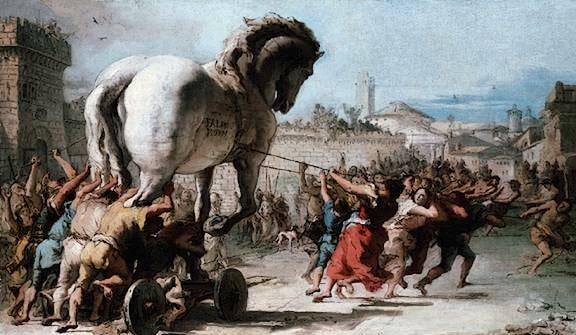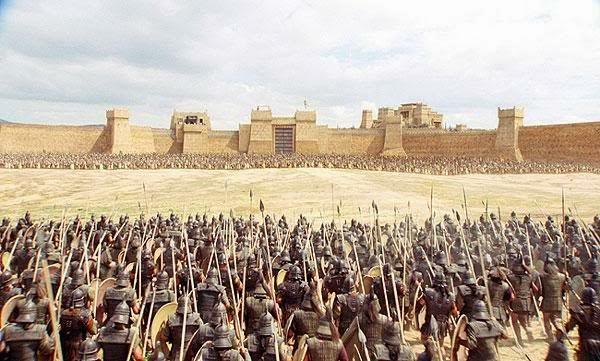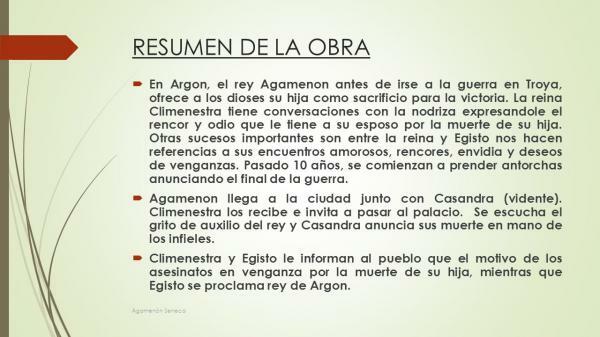The Trojan War: Short Summary

In the Greek mythology a large number of events are narrated, great battles in which the gods are participants. One of these great wars was the Trojan War, an event known to all due to the adaptations that have existed in popular culture. To learn about this conflict, today in this lesson from a TEACHER we are going to offer you a short summary of the trojan war.
Index
- What was the Trojan War?
- Background to the Trojan War
- How was the Trojan War
What was the Trojan War?
The Trojan War is a war conflict from greek mythology in which the Aquean League and the city of Troy faced off. This war is treated in numerous Greek epic poems, although we have only received two poems, the Iliadand the Odyssey, both from Homer. The first one talks about an episode of the war, while the Odyssey deals with the return home of Odysseus.
In ancient times it was thought that Homer's poems were real, believing that the war was totally true, and that it had happened in the Anatolian peninsula. With the passage of time, and the arrival of new civilizations, it was taken for granted that the Trojan War was only
a mythological tale.Years later, in 1870, the team of archaeologist Heinrich Schliemann discovered a city at the location in the one that should be Troy, finding the city of New Ilion, below this other city and below this other. A dozen cities were found, one below the other, but without knowing exactly which of them was the Troy of the poems.
Therefore, there are currently two theories about the Trojan War. Some historians think that Homer's poems derive from a real conflict, which existed, although some of the events themselves are not real. While other scholars believe that the events they narrate have nothing to do with reality.

Image: great battles of history
Background to the Trojan War.
To address this summary of the Trojan War, we must deal with the antecedents, that is, the reasons that caused the war, being mainly Paris's love for Helena.
Zeus, the supreme god of Greek mythology, he had a nymph named Tethys married to a mortal, a king named Peleus. This was because a prophecy announced that the son of Thetis would be greater than her. Peleo and Tethys they had a boy named Achilles, which received a prophecy in which it was said that he would die young in Troy. To protect him, her mother bathed him in the River Styx, making her invulnerable, except on her heel.
On the other hand, at the wedding of Peleo and Tethys, the goddess of discord carried a golden apple, in which she put "for the most beautiful", causing a conflict between several goddesses. To resolve the conflict, an impartial judge was sought, a young Trojan named Paris. Each of the gods promised something to Paris to be chosen as the most beautiful, and the Trojan chose Aphrodite, who had promised him the love of the most beautiful woman in the world.
The most beautiful woman in the world was Helena but she was already married to King Menelaus of Sparta. A short time later, Paris met Helena and fell madly in love with her, but her feeling was not mutual. Paris asked Aphrodite for help, who made Helena fall in love with Paris, and the young Trojan shaved her taking her as his wife to Troy.
This caused all the Greek kings to join Menelaus in his declaration of war, thus starting the Trojan War.
How was the Trojan War.
Shortly after Helena's kidnapping, The Achaean League reached the limits of Troy. The League was a union of different Greek peoples, who had sworn to intervene in the event that any member of the League went to war. Upon reaching the beach of Troy, they encountered part of the Trojan army, waiting for the arrival of the enemies.
Both armies had great commanders, experts in warfare, and whose names have remained in history. The Trojan side was commanded by Priam, Hector and Paris. On the other hand, the Greek side was commanded by Agamemnon and Menelaus, although the soldier who caused the most fear on the other side was Achilles.
Troy was a very well defended city, so it was besieged for 9 years. At that time the Greeks stormed cities and cut off all supply arrivals to the city. During this time, Agamemnon took a slave named Chryseis, daughter of a priest of Apollo. As punishment, Apollo sent a plague on the Greek army, which would only stop if they returned Chryseis. Agamemnon returned the slave, but kept Achilles' concubine as compensation. Because of this, Achilles abandoned the Greek army for a time, and asked the gods for Troy to win the war.
The following days the Greeks suffered numerous defeats, the Trojan army led by Hector advanced positions rapidly, and the Greeks could only defend themselves. The Trojans even reached the Greek bases, but the arrival of Patroclus, a Greek hero, dressed with the armor of Achilles he encouraged the Greeks and they managed to push back the Trojans. Even so, Hector managed to kill Patroclus and steal Achilles' armor, but the latter he killed Hector as revenge for killing Patroclus. Soon after, Achilles was assassinated by Paris, who shot an arrow at the heel of the Greek hero, the only part of Achilles that was not invincible.
A few months later, the most famous event of the war took place: the Trojan horse. The Greeks built a giant wooden horse and hid inside, while the army pretended to leave. Troy thought that the horse was a gift from the goddess Athena but when night came the Greek soldiers got out of the horse, opened the gates of the city and they sacked Troy.
The Greeks took Helen, killed the king of Troy, and completely burned the city of Troy, thus ending the war.

Image: Slideplayer
If you want to read more articles similar to The Trojan War: Short Summary, we recommend that you enter our category of Story.
